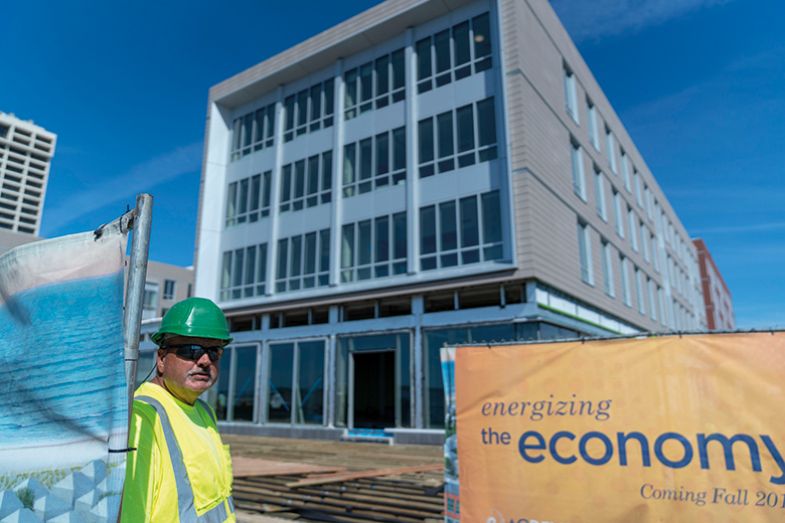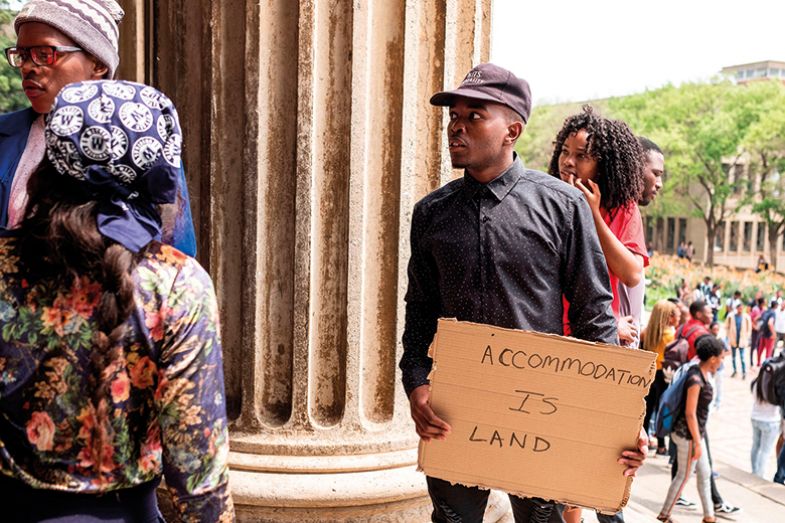Students have always had something of a fractious relationship with their landlords. Whether it is officious proclamations that no noise will be tolerated in university-provided accommodation after 11pm or deafening silence from private landlords when asked to fix the shower, there is often a sense that students’ priorities don’t always align with the interests of those who receive their monthly direct debits.
Yet moving out of the family home into rented accommodation with fellow students is seen as an integral part of the university experience in the UK – and, to varying extents, in many other countries, too. And as higher education participation has grown, so too has the size and value of the student-focused housing market.
A particular source of student angst is the frequent demand that they pay rent for a full calendar year, even though they are only in residence for about 30 weeks a year. But, this year, that particular bone of contention has been ramped up several notches by the fact that many students were shut out of their accommodation from early spring on account of the coronavirus.
A recent survey for the UK’s National Union of Students found that about a third of students believe that the forced decampment back to their family homes (so precipitously in many cases that they were unable to take all their belongings with them) should entitle them to be released early from their rental agreements. However, less than a tenth have been provided with the opportunity to do so.
Nor, of course, is coronavirus-related friction behind us, given the widespread fears among health experts of a second or even third wave of the virus. The NUS has called for students to be released from all future contracts, too, while the crisis continues, given the uncertainty about what universities will be able to offer in terms of in-person teaching. And in Scotland, emergency coronavirus legislation passed by the Scottish Parliament in May allowed students in purpose-built accommodation to give seven days’ notice if they had to leave because of the virus, following NUS Scotland’s “#NotStayingNotPaying” campaign. New rental agreements entered into during the crisis will also have a 28-day notice period.
The varied responses from accommodation providers to the pandemic have highlighted the fragmented nature of the sector in the UK and elsewhere, with provision split between universities themselves, private landlords in the general housing market and the developers behind so-called Purpose-Built Student Accommodation (PBSA).
PBSA blocks have mushroomed in many towns and cities in recent decades as universities have increasingly stepped back from direct involvement in student accommodation. In 2019, property developers Knight Frank valued the UK PBSA market at more than £50 billion, the highest outside the US, while a survey by another developer, Cushman & Wakefield, estimated that there were 660,000 purpose-built student bedrooms in the UK, a third more than five years earlier. The firm estimated that this amounted to annual rents and transactions worth £2.5 billion.
“It is a huge sector,” says Nick Hillman, director of the Higher Education Policy Institute, who has often questioned the pervasiveness of the expensive “boarding school” model of higher education in the UK. “Thirty years ago, there were one or two privately owned blocks, but, by and large, you were in a university-owned hall of residence. That’s changed. When you arrive at the station in Manchester now, one of the first things you see is a huge Unite building.”
Unite is the UK’s biggest provider of PBSA. Strikingly, it announced that it would not be taking payment for the missed summer term.
“It’s the right thing to do,” its operation director, Simon Griffiths, tells Times Higher Education. The company’s focus is to ensure students’ safety during the pandemic, he adds: “We’re focused on what students need right now.”
Some other big private providers have also provided refunds or get-out clauses. Collegiate, for instance, says it offered to let all students defer their next rent payment until August, while Scape is “supporting both returning and prospective students during this period of uncertainty by offering a flexible start date on all tenancies for the 2020-21 academic year”. But not every landlord has followed suit: it was reported last month that Sanctuary Students, another large UK PBSA company, is using debt collectors to pursue students who withheld their summer term rent owing to the campus closures.
Coronavirus aside, there is a sense among many observers that private accommodation providers are increasingly cashing in. The Cushman & Wakefield survey found that the average cost of a bedroom in a UK PBSA block has reached 75 per cent of the maximum maintenance loan available to UK students outside London. That proportion rises to 110 per cent within the capital, where average rents have ballooned by more than 17 per cent in the past five years on account of a “restrictive planning environment” and high demand from international students, with annual rents reaching £27,000 in some cases.
It is not surprising, then, that the NUS survey mentioned above found that 72 per cent of respondents were worried about their ability to pay for their accommodation.

The quintessential US college experience is also thought of as involving living in campus “dorms”. In reality, only about 15 per cent of students are accommodated in this way, says Kevin McClure, assistant professor of higher education at the Watson College of Education. However, the market dynamics are comparable to those in the UK, he adds, prompting a similar influx of private providers. “The market is propped up by student loans,” he explains. “The rent [charged] is more about what a student can borrow than what [accommodation] is worth.”
This means that the relationship between private provider, university and student is “tricky from a consumer and policy perspective – and Covid-19 has revealed that”, McClure says. Universities often lease chunks of their land to private companies to build on, but students often don’t understand who is responsible for their accommodation block. This means that they struggle to understand why some of their peers are able to get accommodation refunds for the lockdown period while others can’t. The situation is particularly confusing given that not every university has been willing to offer refunds on its directly controlled accommodation, resulting in US undergraduates suing more than 50 colleges, including the University of California and Columbia University, to demand partial tuition and accommodation refunds.
Similarly, hundreds of UK students have been on rent strikes, either because they were not using their accommodation at all or because, stuck on campuses and unable to leave, they were not able to access essential services or earn money to cover costs. But issues with private providers in the UK were evident before the pandemic, too.
Last September, for instance, University of Portsmouth students were told only days before the start of the academic year that they would not be able to move into the new PBSA block they had booked. The university’s disgruntled vice-chancellor, Graham Galbraith, wrote at the time that the provider, Prime Student Living, hadn’t put contingency plans in place, meaning that insufficient places were available and resulting in about a fifth of the students who had reserved places there being “‘released’ from their contracts and made homeless. In at least 54 cases, the housing provider hadn’t even signed the contracts yet, leaving our students with no rights.” The full complement of places was not available until four months later – and even then there were no common areas or functional lifts, Galbraith wrote.
Portsmouth’s was one of more than 20 private student developments that were late in the last academic year, Galbraith said, and he lamented “the rise of private student accommodation providers which often have no agreement of any form with a student’s university”. He noted that “student accommodation affects several policy areas”, including “the student experience and mental health, the cost and value for money of universities, and the impact of institutions on their local area”. And, adding that private-sector accommodation is about 22 per cent more expensive on average than university-provided accommodation, he called on the UK government to set maximum rents for students and to “beef up regulation so that students cannot be left without effective rights when things go wrong, specify minimum contract requirements, and give the Office for Students powers to regulate accommodation providers”. He also suggested that “local or national government could build student accommodation themselves or in partnership with universities”, rather than leaving it up to developers.
Hillman, who admits that Hepi receives funding from some PBSA providers, cautions that it would be a mistake to dismiss all private firms as profiteers. For him, there is a big difference between the dedicated providers, whose raison d’être is delivering student accommodation, and those looking “to make a quick buck”.
“It is in [a big PBSA’s] interest to have a healthy, vibrant university system with lots of happy students because their entire business model is based on people wanting to go to university in large numbers and having a good experience,” he notes.
Galbraith concedes that some private providers have behaved very well during the crisis. “Like the university, several local providers gave students the option of leaving their contracts early, should they wish it,” he tells THE. However, “others have behaved poorly, writing to the university to say that as long as students are getting their maintenance loans, they see no reason to release them from their contracts. This completely ignores the challenge many students have faced. Some have lost jobs, or have family members who have, and many are having real financial difficulties.” The situation highlights the degree to which PBSA providers are dependent on government funding, he says, and also underlines their unaccountability to the universities through whose students that money flows. “Relying on providers’ good will to secure value for money and to support students’ well-being is simply inadequate,” he says.

Of course, not all students live financially precarious existences, and for those that don’t, “luxury” housing developments have sprung up, offering features such as private cinemas and gyms.
Hillman believes that there is nothing wrong with students having nice places to live. “It’s a bit like when people complain about universities spending money on facilities: aren’t these better lecture halls, IT systems and cafes [adding up to] a better student experience?” But he concedes that “part of the point of going to university is meeting people who are different from you” – something that may be made more difficult by the prohibitively high price of “unnecessarily plush” blocks.
A similar issue is evident in the US, according to Joshua Brown, an instructor in leadership, foundations and policy at the University of Virginia’s Curry School of Education and Human Development. In his view, “it’s important not to reproduce the housing inequalities of American life in the college system”. Brown, who has researched the impact of residence halls on academic achievement, says that universities should “think creatively” to “lessen the gradations between accommodation where they can”.
One question is whether the post-pandemic global economy might actually do that work for the universities. Shares in some PBSA providers fell during the lockdowns, amid concerns that the supply of international students – who are the prime market for the high-end developments in particular – would dry up, at least until a Covid-19 vaccine is found.
Indeed, even domestic demand is not guaranteed. While university enrolment typically increases during recessions, if teaching remains online then there may be no need for students to be resident in the same city as their university. In the case of the UK, although there is some evidence of significant interest from international students, one report estimated that there will be a 47 per cent decrease in international student enrolment this year.
“It’s red meat capitalism,” says Carl Lee, a geographer at the University of Sheffield researching student housing in the city. “The smaller players are [already] close to going bankrupt. They saw a market, borrowed money on that and are unable to service their debts in this current situation. This is about the financialisaton of higher education, with housing companies harvesting the government’s ‘magic money tree’ of student loans.”
Meanwhile, Chris Mulhearn, a researcher at Liverpool John Moores University who has researched the effect of “studentification” on the city of Liverpool, was never sure that the proliferation of PBSAs in the city was sustainable “because the political indications were that there would be a check on that rapid expansion of higher education. The coronavirus has magnified that. The shock will be much bigger now, and that will be a problem for the universities and cities.”
Universities themselves could also suffer further loss of income from their student halls if campus teaching does not return in September. The University of Sussex, for instance, has said that cancelling rents for those who went home in March lost it £5 million. But not all universities retain any accommodation ownership. Sheffield Hallam University, for instance, sold off its accommodation in the 1990s.

Another inter-institutional difference exposed by the pandemic, Hillman notes, is the varying extent to which universities’ income from student accommodation subsidises other areas of their activity – or, as at some London institutions, the other way around. In the US, many small, private institutions rely heavily on the residential model, explains Watson’s McClure. If students can’t return to campus in September – or won’t because they are put off by online teaching – it will hit their finances hard, he says.
The big US institutions reliant on international students could also be left out of pocket if numbers dip significantly. The University of Arizona, for example, is projecting losses of 80 per cent from new international students and 30 per cent from continuing international students, Inside Higher Ed reports, amounting to a total loss of $33 million (£27 million).
One higher education market that is particularly reliant on international students is Australia’s. “We have the highest per capita population of [international students] for any country, so the issues here are really acute,” says Laurie Berg, an associate professor in the Faculty of Law at the University of Technology Sydney. However, they are experiencing “unchecked exploitation” in their student housing, according to a report, Living Precariously, that she co-authored last November. A survey of nearly 2,500 international students threw up examples of overcrowding and unsafe accommodation, as well as more deceptive exploitation, such as students paying for accommodation that didn’t exist or landlords increasing rents in the middle of rental periods.
“International students are particularly vulnerable as they desperately need an affordable roof over their head in a very crowded rental market, particularly in cities such as Sydney and Melbourne,” says Berg. “There is a regulatory failure here. The government rarely takes action [against rogue landlords], and when it does, the penalties are very weak. That is the context in which the coronavirus hit. It was a perfect storm.”
International students are not eligible for Australian social security benefits or the other job loss support packages that have been rolled out by the government in response to the pandemic, even though research has shown that two-thirds of international students work while studying, mostly in the severely hit retail or service industries.
“There has been a great deal of confidence on the part of state and federal governments here that Australia will always be an attractive destination for international students, so they have been reluctant to extend protections in a broad range of contexts, such as public travel concessions,” Berg notes.
A month after Australia’s lockdown, however, state governments finally began to impose moratoriums on evictions. Since then, Australian states have also announced individual hardship funds for international students. In May, the New South Wales government became the final jurisdiction to provide support, including temporary crisis accommodation for stranded international students, as part of a A$20 million (£11 million) package.
The huge hit to international students’ incomes during the pandemic is particularly relevant to accommodation providers in Australia since international students are their primary customers. While a stay in university-owned, on-campus housing is still considered a major part of the experience for students, particularly at the more prestigious institutions, many domestic students, in reality, live at home. However, international students’ landlords are not generally the universities themselves; the number of international students is so large it dwarfs the available on-campus accommodation, leaving the majority to the vagaries of small, private landlords.
That said, larger commercial providers are making considerable inroads into the Australian market, too. For example, in November 2018, the University of Melbourne entered into a A$300 million, 40-year student accommodation agreement with AMP Capital. A year later, it tied the knot on a A$150 million deal giving the company the right to collect rental revenue on its new campus in the Carlton suburb of the city.
Prior to the coronavirus outbreak, Australian PBSA operators were reporting near-record occupancies. A recent report from real-estate company Savills forecast a sharp contraction in the sector’s growth, amid concerns that large numbers of Chinese students won’t make it to Australia during the pandemic and ongoing political pressure on landlords to go easy on tenants. However, Conal Newland, a director of student accommodation at Savills, remains optimistic that the counter-cyclical nature of enrolments applies as much to international as to domestic students “as people look to upskill or retrain to remain competitive in a shrinking labour market, or even delay entering the labour market”.
In Berg’s view, however, the current dominance of private landlords in Australia needs redress: “It would be better for universities to provide more decent, affordable housing” themselves, she believes. They should also do more to reassure international students that their visas will not be in jeopardy if they speak out against rogue landlords, she adds.

One country that has been besieged by accommodation problems that pre-date the coronavirus is South Africa. Student numbers have increased steadily since the end of apartheid in 1994 and, more recently, thanks to additional funding for the most disadvantaged students, but housing construction has failed to keep up.
Accommodation developer STAG African has estimated that there was a shortfall of more than 300,000 beds at South African universities at the beginning of the year. The problem is particularly acute at rural and semi-rural institutions, which can’t afford to build their own accommodation and whose students – most of whom qualify for full government scholarships – offer scant returns to commercial providers.
“It’s utterly tragic,” says Adam Habib, vice-chancellor of Johannesburg’s University of the Witswatersrand. “[Several] students bunk up in rooms made for one or end up living in the shanty towns outside the university. The problems stem from the fact that South Africa is a deeply unequal country.”
Witswatersrand does not have enough accommodation for all of its students, leaving a significant portion of them reliant on a private market that is unaffordable even to many middle-class students. The government is scrambling to build housing for an extra 200,000 students, Habib says, but the undertaking will take years to fulfil.
The importance of student accommodation is illustrated by the pandemic. When the coronavirus hit, three months into its new academic year, South African students, as elsewhere, were required to leave campus and lock down in their family homes. However, Habib’s university received a huge number of requests from students to return early to campus.
“Students in rural areas – many in informal settlements – don’t have access to the internet so cannot attend university online,” he explains. “They don’t have space to work either, and female students in particular have complained about being expected to help out at home when they want to be studying.”
Yet even when a return to campus is permitted, universities around the world will face the problem of how housing can be provided in a way that conforms with government regulations regarding social distancing.
Pam Schreiber, assistant vice-president for student life at the University of Washington, says that her university is modelling numerous scenarios with regard to possible public health guidance. “The devil is in the detail, we have to think about how all the contingencies associated with those models affect staffing, service delivery and enrolment,” says Schreiber, who is also vice-president of the Association of College and University Housing Officers – International.
Not the least of the considerations is how accommodation issues might affect student enrolment. “If we can’t house a student, it does play into whether they come at all,” she concedes. Even in normal years, students sometimes have last-minute changes of mind about where they want to study, making planning tricky, but “this year it will be incredibly difficult…to tell who will come.” But, in Washington’s case, “We are in a city [Seattle] with other housing options, so we may feel the problem differently to a rural institution that can’t offer other market-rate housing,” she says.
The volatility of demand is likely to be particularly high given the unpredictability of the public health situation even a month or two in advance. “Everyone is hopeful that we will be in a better position in regard to the virus, from testing and contact tracing to breakthroughs in treatment or even a vaccine,” Schreiber says. “Demand for housing seems to be there, but whether or not that comes to fruition depends on so many other variables. We will have to wait and see.”
There are so many ifs. But if campuses remain out of bounds over the coming months and if online teaching continues to develop and gain acceptance among students and academics then perhaps there may come a serious reappraisal of how appropriate the boarding school model of higher education remains in massified systems, and how it should be regulated.
For private landlords in particular, the next year seems likely to be a very nerve-racking one.
Register to continue
Why register?
- Registration is free and only takes a moment
- Once registered, you can read 3 articles a month
- Sign up for our newsletter
Subscribe
Or subscribe for unlimited access to:
- Unlimited access to news, views, insights & reviews
- Digital editions
- Digital access to THE’s university and college rankings analysis
Already registered or a current subscriber?







